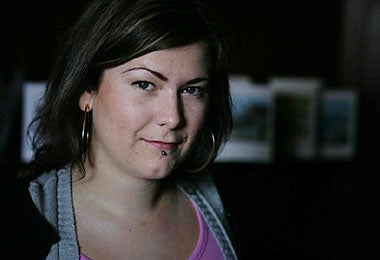Your support helps us to tell the story
From reproductive rights to climate change to Big Tech, The Independent is on the ground when the story is developing. Whether it's investigating the financials of Elon Musk's pro-Trump PAC or producing our latest documentary, 'The A Word', which shines a light on the American women fighting for reproductive rights, we know how important it is to parse out the facts from the messaging.
At such a critical moment in US history, we need reporters on the ground. Your donation allows us to keep sending journalists to speak to both sides of the story.
The Independent is trusted by Americans across the entire political spectrum. And unlike many other quality news outlets, we choose not to lock Americans out of our reporting and analysis with paywalls. We believe quality journalism should be available to everyone, paid for by those who can afford it.
Your support makes all the difference.Katherine Cox, a 22-year-old philosophy student in her third and final year at Leeds University, feels financially unprepared for life after graduation in July.
Katherine eventually plans to work for a volunteering organisation in South America but, as these positions are rarely paid, she hopes to get alternative employment for the time being, at a salary of about £15,000 a year.
In July, Katherine will move back into the family home and pay £50 a month towards bills and food, though ideally she would prefer to rent. Her current spending at university is about £500 a month on living expenses, which include bills, food and going out.
Katherine has taken out student loans of £3,000 a year, totalling £9,000, the last £1,000 of which will be paid to her in May. She hopes to have the loan paid back in three years' time.
She has a First Direct bank account, which is currently £500 overdrawn, and an HSBC Student Account, which is £1,000 overdrawn. The student account is currently free but will begin charging interest once she graduates. It is £1,000 overdrawn. In addition, Katherine owes £2,000 on a First Direct credit card.
Katherine's savings are all in Premium Bonds - amounting to £3,000 - which she does not want to use to pay off her debts.
We asked three independent financial advisers for their help: Philippa Gee of Torquil Clark, Anna Bowes of Chase de Vere and Chris Holmes of One Advice.
DEBT
The first and most important thing to do is to draw up a sensible budget, says Anna Bowes. She should build in an amount she can realistically afford to pay off her debts each month.
Katherine may be able to apply for a credit card offering an interest-free introductory deal, so she can focus on paying off her debt without worrying about interest, but Bowes insists that Katherine must cut up the card so that the debt does not increase.
Philippa Gee suggests Katherine sees her bank manager to discuss whether some or all of her debt could be moved into a graduate overdraft that offers an interest-free period.
Even though her outgoings are relatively low, she still needs to see where she can reduce her spending, Gee adds - an internet site such as moneysavingexpert. co.uk might have some useful tips.
EMPLOYMENT
Gee says Katherine's career will be her most valuable financial asset. Given that it represents her best chance of getting on top of her finances, Gee is concerned that Katherine plans to wait until July to find a job. If she does not start the application process soon, she may find that many jobs have gone and she may face the summer months without any income.
Chris Holmes adds that when Katherine has the income stability provided by employment, it would be best to convert the credit-card and overdraft debt into an affordable loan.
SAVING
Katherine has a fantastic opportunity when she moves back home, says Bowes, who urges her to forget renting for a while so she can clear some debt and build up savings for her South American plans. This is important to plan and budget for, as currently, at £1,000 a year, travelling is Katherine's largest expense.
The advisers agree that Premium Bonds are not the best way to save money, and Gee suggests moving the £3,000 to a tax-efficient cash mini individual savings account. Holmes considers the money a good safety net, and recommends that Katherine at least dips into her savings so that she can make the minimum repayments on her debts until she is working.
If other financial solutions are not available to her, Gee says Katherine may have to consider selling the Premium Bonds and using the money to repay her borrowings. But once she is working, she needs to promise herself that she will start saving to replace the money she has raided.
CASE NOTES: Katherine Cox, 22, Leeds
Personal: Katherine is in the final year of her studies at Leeds University.
Income: £30 a week from her parents; £1,000 student loan, which is still to come.
Monthly outgoings: about £580 a month on general living expenses and travel.
Debt: £9,000 in student loans, including the final £1,000 still due to her; £2,000 on First Direct credit card; £1,500 in bank overdrafts on two accounts.
Savings: £3,000 in Premium Bonds.
For a free financial check-up, write to Wealth Check, 'The Independent', 191 Marsh Wall, London E14 9RS, or e-mail cash@independent.co.uk

Join our commenting forum
Join thought-provoking conversations, follow other Independent readers and see their replies
Comments